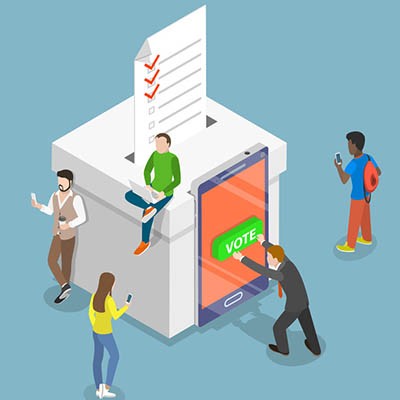The Connection, Inc Blog
Hackers are always getting their hands into sticky situations, but one of the hot topics in world politics--the 2016 United States presidential election--is one of the nastier ones in recent years. In the past few months alone, hackers have reportedly breached not only the Democratic National Committee, but have also infiltrated at least two state election databases.
In October of 2016, the Federal Communications Commission designed a set of rules known as the Broadband Consumer Privacy Proposal. These rules had intended to flip the status quo and require Internet service providers (ISPs) to gain their customers’ permission before they harvested their browsing histories to sell to advertisers. This proposal is now moot with the establishment of a new law that passed through Congress and was signed by President Trump in April 2017.
The huge levels of dissent surrounding this issue boil down to concerns over privacy. While the proposed rules didn’t necessarily prevent ISPs from selling your data for monetary gain, they would have required the ISP to secure permissions from you before they did so. The relationship between ISPs, the Federal Communications Commission (the FCC), and the Federal Trade Commission (the FTC) also played a major role. Many politicians who were opposed to these new rules felt that the FCC had no business determining rules for ISPs, as they felt that responsibility for that was better managed by the FTC.
This opinion was shared by the current chairman of the FCC, Ajit Pai. However, while the FCC no longer has the authority to forbid ISPs from selling their user’s browsing data to advertisers, no power has been given to the FTC to prevent such activity, either.
The government’s actions have provided ISPs with the same abilities as search engines and social media sites, with a few changes. First of all, search engines and social media do not require any sort of purchase, which leads to an implied agreement that in exchange for their free services, they may use your browsing data to personalize the results they show you (although this personalization does allow marketers to target specific demographics of users, which is a very powerful tool for businesses that many users feel is invasive). ISPs, on the other hand, do charge for their services, meaning that this ruling effectively allows ISPs from making twice the profit from you. Furthermore, instead of just tracking your history on select sites and services, an ISP has access to analyze your entire surfing history and profit off of it.
So what does this all mean to you?
Well, that depends. It is possible that ISPs will target online advertisements based on your individual browsing history, emphasizing products and services that you have shown some interest in before. This isn’t new. Amazon, for example, has mastered this through the use of remarketing. While this could presumably lead to an improved browsing experience for many, there is considerable pushback coming from many advocates for privacy.
This is largely due to the fact that your ISP could harvest this data from almost anywhere, including your personal email accounts and any other online activity, in order to sell it, or at least allow marketers to capitalize on it. Depending on the data collected, this could potentially include personally identifiable information or sensitive account credentials--which could then be up for sale to whomever wanted to buy them from the ISP. Even if we weren’t worried about ISPs selling this type of sensitive data, it opens up another potential way for hackers to gather that data, if the ISP is lax on security.
This isn’t the only advantage the ISP gains, either. Under the rules that were scrapped, an ISP would have been required to alert their customers of a data breach. Arguing that this would only lead to ‘notification fatigue,’ the ISPs were also able to remove these rules, meaning that they are no longer obligated to inform you should your data be at risk.
So, how can you prevent your sensitive information from being collected?
Unfortunately, that may be easier said than done. While ISPs still have free reign to collect your browsing data as they please, they are not able to do so if you opt out. This is not to say that all ISPs have made opting out easy, so you may have to make a phone call, and you have to take them at their word that they are no longer tracking you.
There are also some ISPs who are opposed to the privacy repeal, but around 80 percent of Americans have only one or two options for broadband in their area.
Utilizing a virtual private network is another option available to you, but this approach isn’t without its drawbacks, either. Just as an ISP can, a third-party VPN can access and sell your browsing data, if they so choose. For a personal user, a VPN can be costly and cumbersome, however businesses do benefit from them every day. Tor browsing is another option, although it is more complicated, slower, and can potentially be unsecure.
In short, there really isn’t an easy, guaranteed way to secure your browsing history against the peeping eyes of your ISP. All you can do is implement some of these methods to defend yourself to the best of your ability.
Election Day in the United States is coming up quick on November 6th. It doesn’t matter what your thoughts or opinions on U.S. politics are--the fact remains that millions of Americans will be using the technology available at polling places to cast their ballots, and if this technology isn’t secured properly, the integrity of the voting system will be at risk.
Technology Found at Most Polling Places
Most polling places in America are using technology that is quickly approaching 15 years old. To put that in perspective, let’s think about some technologies and products today that haven’t even reached ten years old yet.
- Google Chrome
- Airbnb
- Spotify
- Kickstarter
- 4G
- Mobile GPS
- The iPad
A co-founder of a nonprofit group called Open Source Election Technology, Greg Miller, has this to say about election technology: ”You have equipment that was introduced in 2005. In that time frame, how many times have you changed your mobile phone? And how many times have we replaced our laptops?” In essence, Miller describes election technology as “...obsolete hardware [and] software that relies on a diet of spare parts.”
The other co-founder of OSET, John Sebes, takes a different approach by showing just how vulnerable the systems are to manipulation. Most polling places have a portable media device, like a CD or USB drive, that must be used to transport the results to another location for the tally. The machines that count the votes are usually outdated in terms of both hardware and software. Sebes initiated a live demonstration for a national news network to show how he could influence the results of an election between two fictional candidates named Thorfer and Varda. Thorfer won with 3,000 votes while Varda received only 100, yet Sebes was able to use malware to switch the tallies around, creating a fraudulent winner. While some computers used for this purpose are secured, others are not so much.
Furthermore, there is some inconsistency in regard to whether or not polling places keep a paper backup of the vote in the event a recount is needed. This includes some of the “battleground” or “swing” states where small numbers of votes can sway the final outcome much more than in other states.
How to Minimize the Issue
The easiest way to resolve this problem is one that is just impossible to pull off. The United States Constitution specifies that each state is responsible for maintaining its own set of electoral procedures, meaning that any attempts at consistency will be made impossible. There are other ways to make progress regarding election system security, even if some of them are more low-tech than anything else.
Temporarily Cease Online Voting
Some states allow online voting for those who are abroad or are unable to make it to the polling place for whatever reason. Some even allow for email ballots. Unfortunately, security for these methods is subpar to say the least, and it should be suspended until it can be secured properly.
Use Physical Backups
Ordinarily, we would suggest that all backups be saved to the cloud. In this case, we’re dealing with something a bit different, as digital assets can be hacked. A physically-generated paper backup of the voting records is less susceptible to being tampered with, and it allows for cross-checking any results.
Invest in Improved Voting Equipment
Since the devices used in the voting process are over a decade old, it’s clear that updating this infrastructure is not a priority. Some have suggested that Congress get involved to expedite the process, creating funding opportunities to improve machines and replace older devices, but this hasn’t happened since 2002.
What are your thoughts on the current state of election technology? Let us know in the comments.
News & Updates
Understanding IT
Get the Knowledge You Need to Make IT Decisions
Technology is constantly evolving, and keeping up can feel overwhelming. Whether you want to understand cybersecurity threats, explore automation, or learn how regulations like PCI DSS impact your business, we’ve made it easy to access clear, straightforward insights on key IT topics.
Contact Us
Learn more about what The Connection can do for your business.
The Connection
51 Village CT
Hazlet, New Jersey 07730



